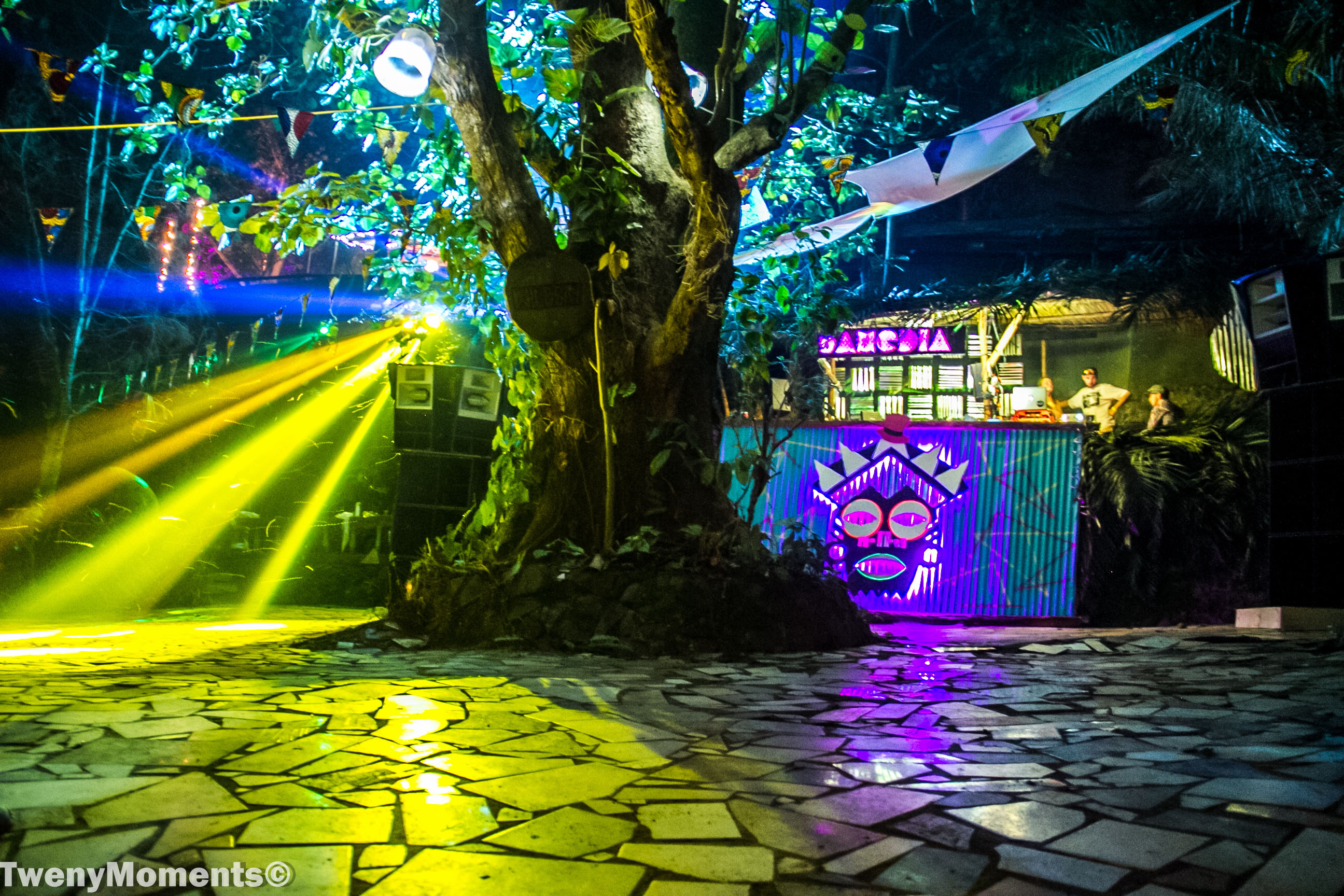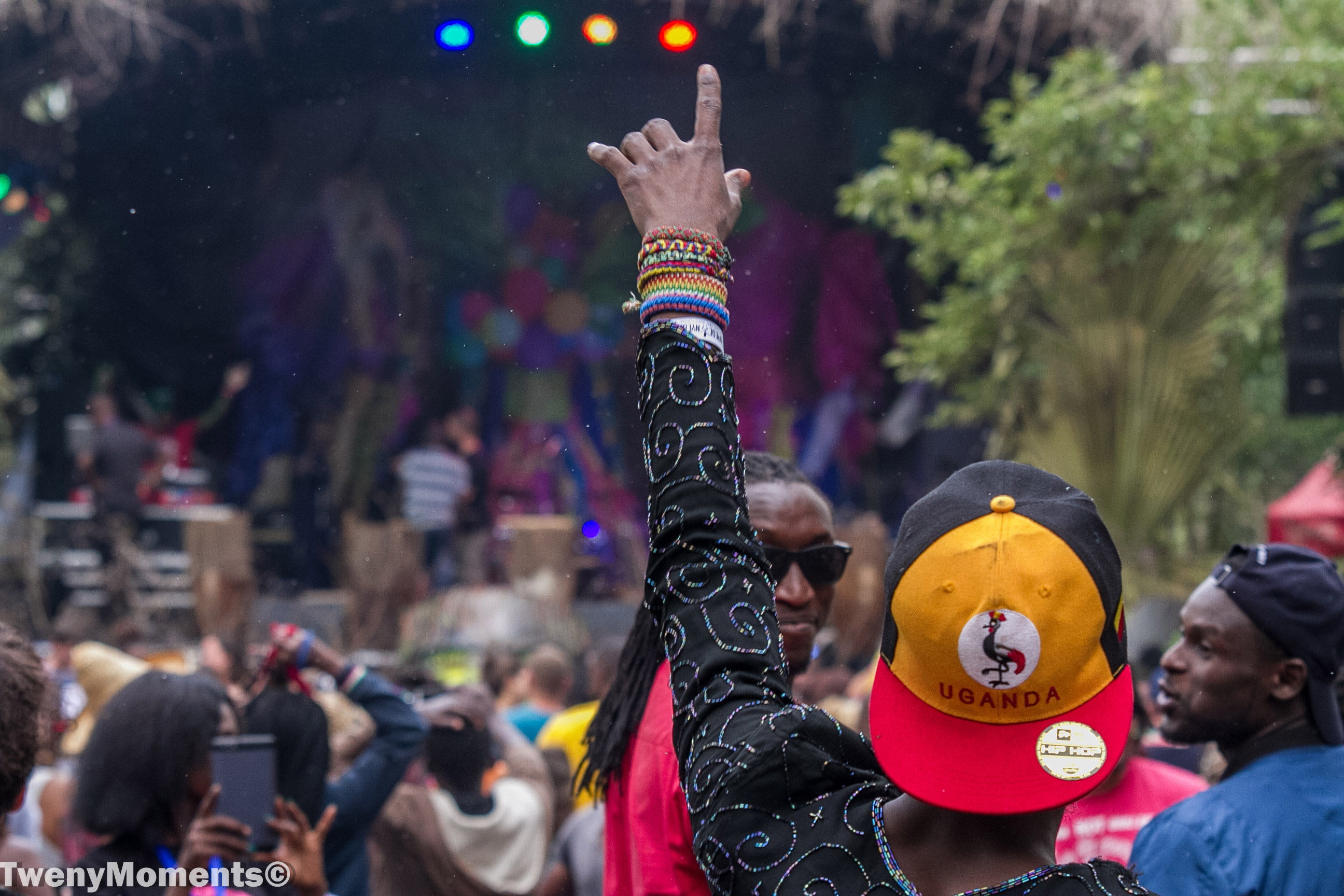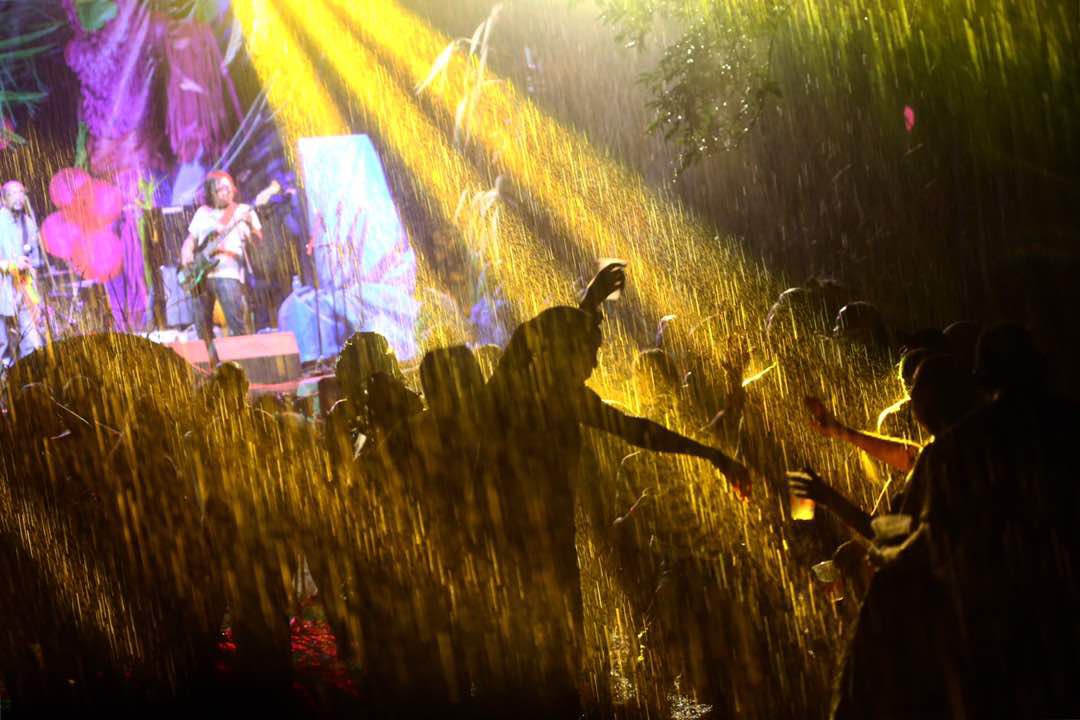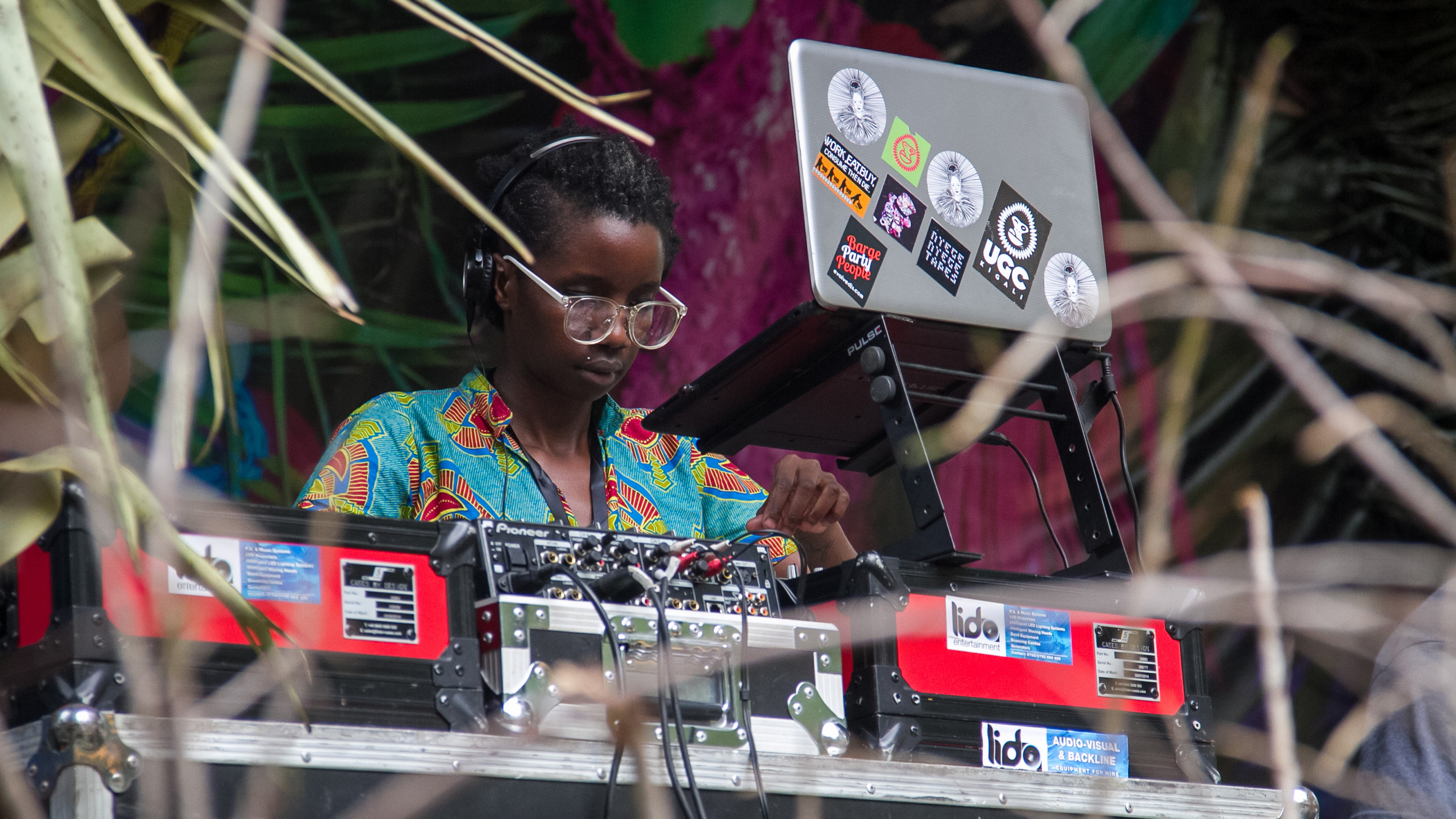Most people hadn’t even set up their tents when the sky darkened and swelled, pregnant with the tropical deluge that within minutes would turn everything to mud and water. But even as the rain fell and thunder rumbled close by, the first arrivals gathered by the main and stage and kicked off their shoes, dancing in the rain, clothes and hair soon clinging to their skin. A seamless mix of Benga—the popular music of midcentury Kenya—and electronic beats by Kenyan DJ Gregg Tendwa and his musicians kept the hips winding and the booties twerking.
The opening acts and accompanying downpour set the tone for the rest of the weekend—three days of rain, mud, dope music, and relentless dancing. And while the first two are incidental, the music and the dancing are at the very core of Nyege Nyege, Africa’s newest and fastest-growing underground music festival. Its spirit is in the name—Nyege Nyege, meaning the uncontrollable impulse to dance, and the urge for physical closeness and exploration.
Set in Uganda on the shores of the river Nile, the festival, now in its third edition, celebrates the most exciting transformations in underground African music, from the kids laying down bars in the back streets of Dar Es Salaam, Tanzania, to the self-taught producers replicating traditional ancestral rhythms in the arid and remote plains of Northern Uganda.

courtesy of Nyege Nyege
The multitude of sounds being represented at Nyege Nyege might come as a surprise to many Western ears. Although in recent years there has been a surge in popularity of African music in Europe and the States, a lot of it has been a rediscovery of Africa’s past through a string of excellent re-issues of ’60s and ’70s West African funk, disco, and Afro-rock. But while re-issue culture is helping us appreciate great musicians of years gone by, it leaves us woefully unaware of the vibrancy and dynamism of Africa’s current musical landscapes, especially those just out of the mainstream.
And out of the mainstream this line up definitely was. By Friday night, the weird, wonderful, and varied nature of Nyege Nyege was in full force, the venue coming into its own as night enveloped it. A knot of steep cobbled footpaths, which seemed to wind around each other in an endlessly confusing labyrinth, led down from the main stage area toward the leafy shores of the Nile. Intricately decorated gourds and colorful lights decorated the trees, while dozens of food vendors set up their tables to the yellow flickering light of kerosene lamps.
After all, isn’t their music African by default?
In a small opening and under the thick foliage of a mango tree, the Eternal Disco stage provided electronic beats well into the daylight hours, to the delight of the more hedonistic among us. The evening opened with a set by East African Wave, a collective of five young Nairobian producers and DJs who over the past few years have played a large part in creating a lively music scene around their style of electronic music, an amalgamation of down-tempo beats, trip-hop, and trap. Like many of their urban, uber-connected contemporaries, the guys of EA Wave fight against the idea that they must at all costs incorporate “tribal” or African elements in their music. After all, isn’t their music African by default?
Later that night Otim Alpha, who took to the main stage dressed in a kitenge suit and hat, showed the audience that being a very tall man doesn’t mean you can’t be a nimble mover. Opening his set with the dizzyingly hypnotic and fast-paced track “Bilaber,” Otim gave the audience a taste of electro-acholi, the genre he is widely credited with creating together with his producer Leo Palayeng. Hailing as he does from Gulu in Northern Uganda, home to the Acholi tribe, Otim’s relationship to technology is very different to that of EA Wave, but no less central to his music. While they use their laptops to draw inspiration from all corners of the globe, Otim’s music is rooted in the Acholi musical tradition, but reinterpreted through simple music production software. The results are relentless polyrhythmic beats and call and response vocals, which on Friday night had the audience in frenzy within seconds.
I later found Otim—a former boxing champion—selling little beaded necklaces and bracelets that his grandmother had made especially for the occasion. “I feel so good,” he told me with a wide smile. “I love this festival. It promotes all kinds of music, it brings musicians from the small villages, and you can meet people from all over and exchange ideas.”
Despite being a celebration of African music, Nyege Nyege takes inspiration from the legendary World Festival of the Black Arts that took place in Dakar, Senegal, in 1966, in as much as it also celebrates the cultural links between Africa and those who it inspires. An open invitation from Uganda to the world, the festival lineup always includes a number of non-African artists whose music is influenced by the beats of this continent. Europe was well represented on Friday with Italian duo Ninos du Brasil, who kept the energy high with their unyielding live drumming performance, which merged techno beats with the colorful rhythms of Brazilian carnival.

courtesy of Nyege Nyege
By Saturday morning, judging by the number of people who lay asleep under bushes or in the hammocks strung up in the forested Chill Area, and by those whose heads were still firmly by the speakers, eyes large as saucers, it was safe to conclude that the party spirit is alive and well in Uganda.
Nyege Nyege’s fast-growing reputation is attracting increasingly large numbers of people from all over the continent: some had driven to the festival from as far as Rwanda, a bumpy ten hours away, while the Nairobians arrived in full force, renting whole coaches to transform into seventeen-hour “party buses” that kept going all night. Even a small group of South Africans took the long flight from the southern tip of the continent to come and check what this festival was all about. And no one was going to let the heavy downpours get in the way of their fun.
The party spirit is alive and well in Uganda.
During the rain and the thunderstorms, and through day and night, the Umojah stage never stopped pumping out sunny reggae and dub vibes. The powerful Umojah Sound System is the only hand-made reggae/dub sound system in the region, and the enormous speakers were hauled all the way from Nairobi to shake the fest to its fibers.
Further down a small hill, which was starting to resemble a mud slide, the main stage welcomed the Albert Ssempeke and the Buganda Music Ensemble, one of the many traditional groups featured during the festival. Ssempeke, a well-known Ugandan singer, is an expert in Ugandan culture, music, and dance, and he carries down the musical traditions of his family, who were musicians in the court of the king of Buganda, a sub-region of Uganda. Although performed entirely with acoustic, traditional instruments and different drums and percussion, the rapid rhythms and chanting were equally as mesmerizing and energetic as the electronic and techno that sets followed it.
In the evening, Kongoloko changed the vibe entirely by dropping some heavy hip-hop from the Democratic Republic of Congo. Their set opened with several masked dancers draped in kitenge robes eerily drifting onto the stage, then broke into a powerful, spasmodic performance, as emcees Le Bon and Cruz bound around the stage dropping rhymes in French.
By this point the festival was at full capacity, and navigating the narrow, steep, and slippery pathways was rendered all the more difficult by the hundreds of people flowing from stage to stage, and the countless others looking for the darkest nooks and crannies: the grassy areas by the Nile, the hammocks in the Chill Area, and the little wooden platforms overlooking the river were all perfect spots to indulge in the most hedonistic of impulses.
Sunday morning rolled around and brought with it some promising rays of sun, encouraging dozens of people to take a little dip in the cool and murky waters of the Nile, just beneath a large “Swimming Is At Your Own Risk” sign.
While some began packing up their tents to return to ordinary life and a doubtlessly unpleasant Monday, an equal number could be found lurking between the trees, blurry eyed and shoeless, as three days of uninterrupted partying started taking their toll. Although the dark skies seemed to promise more heavy rainfall, the afternoon stayed dry, and the dwindling—but by no means small—crowd could enjoy the funky performance by the poets and percussionists of Abakisimba Troupe, who fuse traditional sounds from various parts of Kenya with contemporary influences.

courtesy of Nyege Nyege
The Kenyan contingent kept going strong throughout the evening, as Nairobi’s Asili Dub took to the stage and captivated the crowd with their dub bass lines and trickling guitar riffs. Suddenly, the skies opened and let out a deluge like no other, the heavy drops soaking through our clothes within seconds. But we stayed, unable to tear ourselves from the deep, soulful vibes that the musicians were sending our way, as if connected by an invisible string.
As the rain washed away what was left of the venue, and the pathways turned into fast flowing torrents, millions of little white lake flies rose out of nowhere, fluttering between the variously colored lights and creating a psychedelic display, like millions of paper confetti floating in swirls and spirals in the air.
The music and the dancing never let up, continuing through the night and well into the next day, long after the rain had stopped. FL









